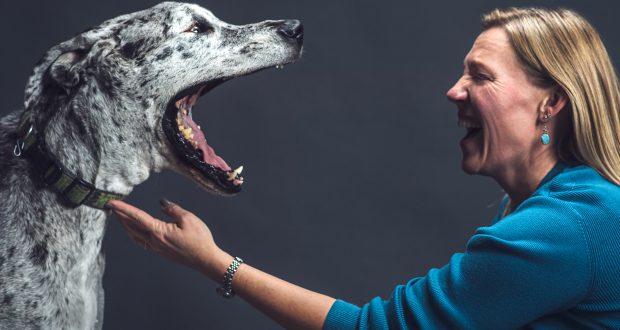Audrey Ruple, a veterinary epidemiologist and assistant professor of One Health Epidemiology in the College of Health and Human Sciences’ Department of Public Health, with Bitzer, a Great Dane. (Purdue University photo/Rebecca McElhoe)
Almost 80,000 dogs have been nominated to participate in a new nationwide study on dog aging since registration began last fall, but there’s still time for your dog to become part of the pack.
“We know from previous work done with dog owners that they are motivated to help their dogs live longer, healthier lives, but the response has been positively overwhelming,” said Audrey Ruple, a veterinary epidemiologist and assistant professor of One Health Epidemiology in the Purdue University College of Health and Human Sciences’ Department of Public Health.
The Dog Aging Project will look at dogs from all breeds and mixes from across the nation. This is the first major longitudinal study involving dogs, and it’s scheduled to last at least 10 years.
“Dogs are good models for humans,” said Ruple, who is one of more than 40 scientists and researchers participating in the study. “They have similar genetics, share our environment, and they also have similar diseases and health issues. We will be asking, ‘How do dogs age healthfully?’ in order to help better understand how we can age healthfully, too.”
Dogs of all age ranges, breeds and sizes are eligible to participate. Owners can go online for more information and to register their dogs. The most popular breeds submitted so far for the study are Labrador retriever, golden retriever, German shepherd, dachshund, Australian shepherd, poodle, chihuahua, shih tzu, boxer and Yorkshire terrier.
Once enrolled, owners will need to complete surveys about their dog’s health and lifestyle. Dogs must go through their regular annual examination with their veterinarian. If a dog is assigned to a specific study group, owners may be sent a kit for the veterinarian to collect blood, urine or other samples during the annual visit. Participation is voluntary, and there is no cost to participate.
Ruple said the group also is trying to find the nation’s oldest dog.
Dogs have been nominated from all 50 states. The states with the most nominated canines are California, Washington, Texas, Florida, New York, Illinois, Pennsylvania, North Carolina, Colorado and Ohio. States with the least nominations are North Dakota, South Dakota, Wyoming, Delaware and Mississippi.
The group has had nine dogs nominated that were 24 years old, as well as nine other dogs that were 23 years old.
All dogs registered will be eligible to participate in various studies.
Researchers hope to find out more details on how factors like an individual’s genome, proteome, microbiome, demographics and environmental factors such as chemical exposures and noise pollution impact health and longevity.
Ruple said one goal of the study is to not just improve the health and longevity of dogs, but also extend those findings to improve human health.
“By studying aging in dogs, we hope to learn how to better match human health span to life span so that we can all live longer, healthier lives,” Ruple said.
Funding for the Dog Aging Project comes from the National Institute of Aging, a part of the National Institutes of Health, as well as from private donations.
 Dog Living A lifestyle magazine for dog lovers
Dog Living A lifestyle magazine for dog lovers





